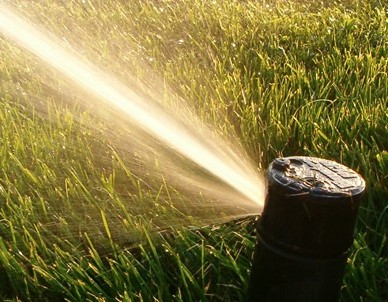Get an Immediate Response 24/7 - Water, Flood, Sewage, Mold - Insurance Claims Welcome 801-436-5225
Basement Flooding due to Broken Sprinkler Lines! How To Detect a Broken Sprinkler Pipe Before it Causes Flood or Water Damage to Your Home.
This post was originally published on Apr 3, 2015 and updated on Jun 5, 2020.
Many people often think that the summer time is a slow time for disaster cleanup companies. Wrong! It is one of our busiest times of the year because the overall consumption of water in the state of Utah goes up dramatically once sprinklers get turned on. Whenever a plumbing source is being used, there is always a greater chance for water damage to occur.
One of the most common water losses we see during the summer months are broken sprinkler lines. Many people forget to check their sprinklers at the beginning of spring to make sure everything is running properly. Once the automatic sprinklers turn on, what they don’t realize is that they have a river of water traveling across the ground into their house. Automatic sprinklers are great, however; most people set their sprinklers to run very late at night or very early in the morning when they are asleep. This allows for 6-8 hours to pass by without them knowing that they could potentially have a major water loss that causes a high water bill or water to flood into the home.
Here are some tips on how to check your sprinkler system for broken lines and how to tell if you may have water leaking:
- Prior to beginning to use your sprinkler system in the spring be sure to monitor evening temperatures. Check the forecast and statistics to make certain that some nights are not still dipping below freezing. It may be good to invest in an outside thermometer so you can check the temperature on your property yourself.
-
When first firing up your sprinkler system in the spring, be sure you check all sprinkler heads for any malfunction. Salt Lake City has long winters, which can damage sprinkler systems due to expanding and freezing water. Lawn mowers in the spring pose a hazard to sprinkler heads as well. It doesn’t cost a lot to replace them and is well worth the investment compared to flood cleanup.
-
Double check the hose bib or spigot on the outside of your house to make sure it is working properly. Pipes freeze over the winter time and many times you don’t know the pipe is broken until it’s too late. Water can leak into the foundation or into your garage if damaged. It’s better to replace an old valve or pipe rather than have it leak. Preventative maintenance will save lots of headache and lots of money down the road.
-
Once you have inspected the hose bibs and sprinkler heads and have turned the sprinklers on, take a look at the yard to see if the water pressure and coverage is even. Low pressure or heads that don’t work at all could be a sign of a cracked or broken line underground. Also check to see if any areas of the lawn become overly saturated or soggy, which could also indicate a leak. Over time, even with proper precautions, hidden roots can also pose a threat by growing into the system.
-
Check your valves for leaks while the sprinklers are running as these are a component which can wear out over time. Valves are typically located in green boxes somewhere in the grass of your lawn or in a boarding feature such as a flower bed. Simply remove the lid and inspect visually for water leaking out at the joints.
An ounce of prevention is worth a pound of cure! Follow these tips to minimize the risk of a flooded basement, garage or home during sprinkler start-up season. For more tips or if you have a flood or water damage emergency, call Quality Disaster Cleanup at 801-436-5225 or visit our water damage page https://qdcutah.wpengine.com/water-




Comments
0